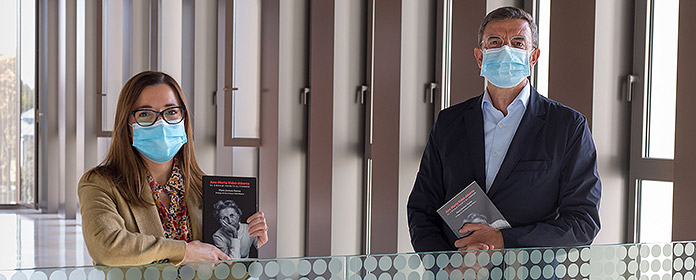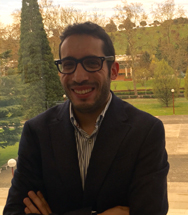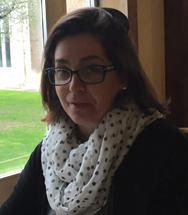Presentación del libro <i>Ana María Vidal-Albarca, el coraje frente al terror</i>
Written by María Jiménez Ramos, it has been presented in the framework of the seminars of the group of research in Recent History (GIHRE), of the School of Philosophy and Letters.

On Friday, October 9, María Jiménez Ramos presented her latest book Ana María Vidal-Abarca, courage in the face of terror. A biography in which the author describes the life of Ana María Vidal-Albarca, widow of Jesús Velasco, Chief of the Miñones de Álava Corps and assassinated by ETA on January 10, 1980. As the author explained, Vidal-Albarca, mother of four daughters, had participated in politics during the initial years of the Spanish Transition, committing herself to Alianza Popular. However, after the assassination of her husband, the tense climate in Vitoria and the rest of the Basque Country due to terrorism made her leave, like so many other families in very similar circumstances, for Madrid. There he met Sonsoles Alvarez del Toledo, also a widow, and Isabel O'Shea, both victims of ETA terrorism. With them she started the "Brotherhood of Relatives of Victims of Terrorism" between 1980 and 1981. It did not take Ana María long to understand the loneliness, helplessness and pain in which so many families had been plunged after the appearance of ETA, families often headed by housewives, who supported their children with insufficient widow's pensions and who also continued to bear in many cases the "stigma" of being victims of ETA. The Basque society of those years, years in which the gang's activity was more deadly than ever, reaching 90 fatalities per year and hundreds of attacks, was a society immersed in fear and also in a certain "justification" of the gang, despite the fact that ETA showed that it excluded itself from the national reconciliation sought by the Transition.
Ana María, Sonsoles and Isabel then embarked on the task of giving visibility and obtaining support for the victims: Sonsoles, a nurse from training, dedicated herself more directly to the attendance of these families, Ana María and Isabel tried to achieve social and legal recognition for the association, in order to achieve greater support and raise public awareness. In 1991 the Government denied them aid, and it was not until 1995 that the ABC newspaper supported them in a large fundraising campaign to help the victims and to promote a legal office. As the author of the biography, María Jiménez, said, "activism for the victims has gone ahead of legislation". A long road, not Exempt of much suffering, that has been shaping the association of Victims of Terrorism that we know today. In the presentation María Jiménez also explained the procedures of her research and the more than forty interviews she has conducted with members of Ana María's family. For many of her relatives it meant opening a wound that has not yet been healed, because although Ana María was fully committed to the cause of the victims, she always carried her own pain deep inside and alone. Her relatives remember the strength with which her mother or grandmother used to tell them: "The most important thing is to be good". María Jiménez ended her presentation with a few words from her biographer that summarize the work to which she dedicated her life: "There are times when it may seem that you lose, but you win, because you win when you are a good person, you always win when you try not to harm anyone, you win when you defend life and freedom".


